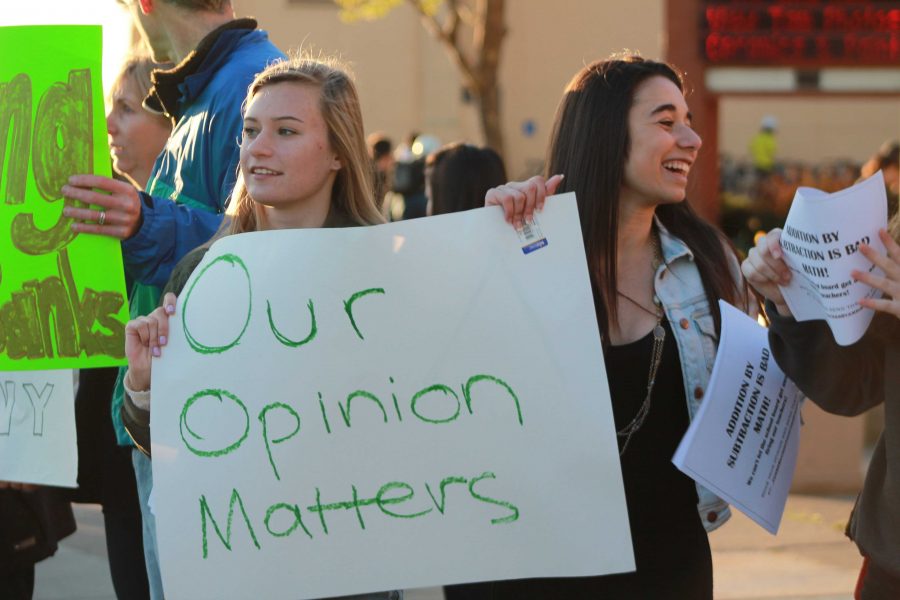The recent announcement that three non-tenured math teachers were designated non-reelect by Principal Julie Synyard and will not return next year stirred rumors, petitions and outrage within the Tam community. Since the district cannot legally disclose information about personnel decisions and Tam does not make teacher evaluations public, many students feel left out of the dialogue. Although we understand that reasons for non-reelections can’t be shared with the public, we are concerned about both district and site administrations’ borderline-irresponsible course of limited communication amidst significant personnel and curriculum changes.
This problem is demonstrated in the context of the teacher evaluation process and these non-reelections. Student input seems to be casually considered at best, and largely ignored at worst. Anecdotally, many students of Ryan Federoff and Anders Fairbanks—two of the non-reelected math teachers—claim to have submitted positive student evaluations of these teachers. This corresponds with impressions expressed by math department teacher leader David Wetzel and Fairbanks (see page four).
We’ll never know the full details behind the decision to let these teachers go; we understand the confidentiality law. But we don’t understand why students’ efforts to convey our opinions seemed to go unconsidered, especially by the school board, who upheld Principal Synyard’s decision and finalized the dismissals on March 12. Students lack a directly accessible mode of student-to-administration communication; our student trustee to district board meetings holds only a symbolic vote and is excluded from closed session meetings. And when we make petitions, such as those created to save the non-reelected math teachers that garnered hundreds of signatures, we can’t help but feel that they fall by the wayside without parent involvement.
Constructive criticism, another valuable mode of communication, was also lacking in the evaluation process. Fairbanks said he wasn’t aware of any concerns prior to his non-reelection, which highlights a flaw in the teacher-administration dialogue. Federoff expressed similar disbelief in a March 8 Marin IJ article. Even more disconcerting is that the three teachers themselves remain in the dark as to why they were not reelected. Had this information been released to the teachers, even under a nondisclosure agreement, school administration could have better shown their commitment to staff communication. But because they weren’t, these teachers can’t know what they did wrong and won’t be able to improve for their next job.
The lack of information exacerbated the problem as parents, community members and even local media outlets fed on the story. Further administrator silence fueled an unsigned press release that crafted an image of teachers wronged by a looming administration, and raised unsubstantiated allegations connecting the non-reelects to Assistant Superintendent Michael McDowell and his prior relationship with New Tech Network, a nonprofit service and support provider under district contract. A March 8 Marin Independent Journal article further contributed to the sensationalism with a dramatic headline (“Tam High embroiled over teacher firings and new teaching methods”), and also conflated supposed disagreement over the New Tech Network with the non-reelections.
Eventually, on March 10, Superintendent Dr. Laurie Kimbrel sent out an email to Tam parents and staff — but not students—citing the California State Law policy on personnel confidentiality and commenting on the optional, unrelated integration of the New Tech Network program into TUHSD classrooms. Had a more open communication system been in place earlier in the process, perhaps the administration would not have needed to engage in overdue damage control.
Tam News reporters have tried to remain informed on a variety of district-driven reforms, with the implementation of Common Core at the forefront of our attention. Attempts to understand this shift in curriculum have been surprisingly difficult, as teachers in multiple departments, from math to science to P.E., have offered sometimes conflicting information. As students, we have observed a shift in Tam’s climate, one that is tenser and stormier than in the past. Over 40 Tam faculty members attended the March 12 board meeting that upheld Synyard’s personnel decision, the likes of which typically pass under the radar. It’s unlikely that district administration is fully to blame here, as the reactions of the math department, parents and local news outlets should have exerted greater measures of restraint in the absence of hard facts. But insufficient communication from site and district administration is contributing to growing discontent. We fear that if left unaddressed, this communication problem will only fester.


